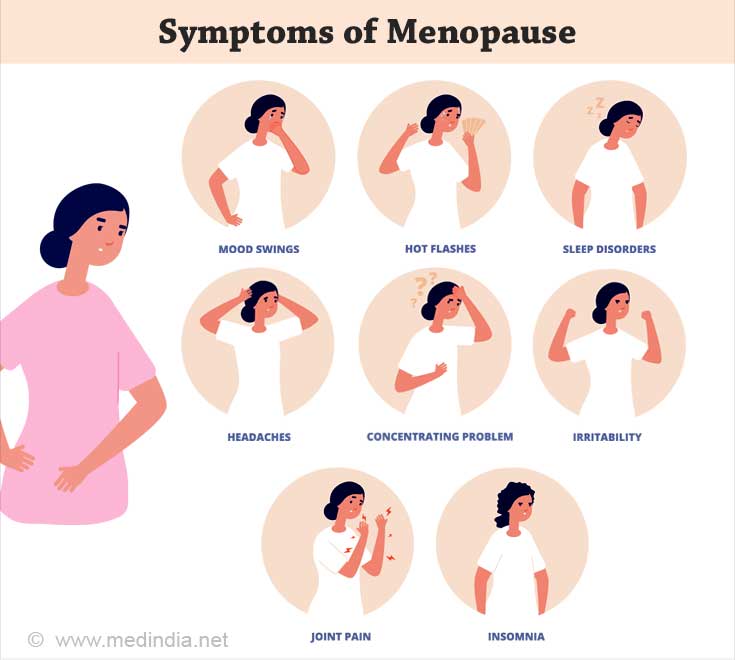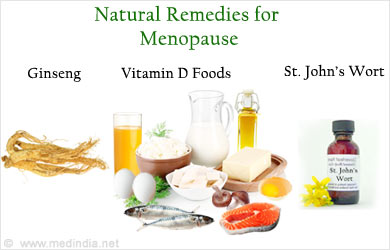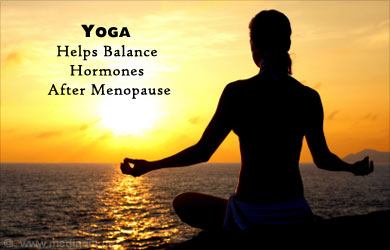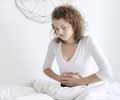What is Menopause and Sex?
Menopause literally does not have to ‘pause’ anything in your life; in fact it should be considered as a new beginning. If you believe so, then this transition between the reproductive and non-reproductive phase of your life will be quite smooth. ‘Itchy, bitchy, sweaty, sleepy, bloated, forgetful, psycho’ are considered as the seven dwarves of menopause. ‘Mood swings’ are also experienced by many women just like PMS, but fortunately they don’t come back every month.
Due to the fluctuation of the hormones, many women experience change in sexual function during the years immediately before and after the menopause. Decreased libido, decreased frequency of sexual activity and painful intercourse are some common problems encountered by post-menopausal women.

Symptoms and Signs of Menopause
Changes in monthly/menstrual cycle: You may notice some irregularities in your period like you could bleed heavier or lighter than normal. The length and duration of your period could also change. A missed period generally indicates the onset of menopause after conducting the pregnancy tests and ruling out pregnancy.
Hot flashes: It is a sudden feeling of heat either in the upper portion or all over your body; the intensity varies in different people. You could feel sweaty or flushed and due to this, your face could turn red or blushed.
Mood swings: It is natural for women to go through feelings of irritability, depression, and mood swings, and often go from extreme highs to severe lows in a short span of time due to fluctuation in their body hormones such as estrogen.
Vaginal atrophy: Due to decline in estrogen production, there is gradual thinning and inflammation of the vaginal walls. This condition could make sexual intercourse painful for women and could also lead to decreased libido. OTC lubricants or prescription estrogen therapy, such as an estrogen cream or a vaginal ring could help in treating the condition.
Skin, Hair, and Other Tissue Changes: As you age, the loss of fatty tissue and collagen will make your skin drier and thinner. This affects the elasticity and lubrication of the skin near your vagina and urinary tract. Reduced levels of hormones such as estrogen may contribute to hair loss and make them brittle and dry.

Natural Remedies for Menopause
Several natural remedies have been tried for menopause. However, adequate evidence may not be available to prove their benefit. They include:
Black cohosh: It is known to regulate the body temperature as well as ease the feeling of depression which is common during menopause. It comes from a plant in the buttercup family and is widely used as a natural source of treatment for hot flashes.
Yoga: It is a known fact that the relaxation and stretching techniques of yoga can help relieve irritability and depression brought on by menopause. Deep breathing and meditation which are practiced during yoga is known to calm the mind and could ease menopausal anxiety and hot flashes.
When you feel a hot flash coming on, start deep inhalation through your nose to the count of four. Then hold your breath for about seven counts and exhale slowly through your mouth to the count of eight. Repeat this procedure two more times
Vitamin D: Your body produces vitamin D in response to sun exposure. Women know that as they age, their risk of bone density loss is higher because of the diminishing ability to absorb vitamin D, which is essential for healthy bone renewal, normal cell growth and hormone balance. Hence, get plenty of sunshine and eat foods rich in this vitamin such as sardines, salmon and dairy products.
St. John’s Wort: It is obtained from the leaves and flowers of a wild flowering plant called Hypericum perforatum. They could be brewed in a tea or taken in a pill or liquid form. It is used to improve sleep, relax your body as well as reduce depression and anxiety. However, since St. John’s Wort could possibly interact with other medications, it should be strictly taken under medical supervision.
Ginseng: It has been widely used for its therapeutic health benefits by Chinese, Native Americans, and Koreans for many years. It is known to reduce anxiety, fatigue and stress, which is widely experienced during menopause.

How does Menopause affect Sexuality?
Menopause could have a huge impact on the sexuality of women in more ways than one, with loss of libido and vaginal dryness being the two primary complaints. The diminished sexual drive experienced by many women is very frustrating to them and is mainly due to loss of estrogen and testosterone following menopause, making them less sensitive to touching and stroking and thus not easily aroused. Nearly 20 to 40 percent of women experience this low sex drive, which is likely to return when the body has adjusted to the new hormone levels.
Another problem faced by nearly 60 percent of postmenopausal women is dryness of the vagina due to a drop in blood supply to the vagina. The tissues of the vagina consequently become thin and since there is a lack of vaginal secretions, it leads to decrease in natural lubrication which could result in painful sex. Itching and soreness in vaginal area are also experienced by many women. It is usually treated with water-soluble lubricants such as Astroglide or K-Y Jelly. Vaginal moisturizers like Replens and Luvena are frequently used to increase the lubrication of the vagina.
On the flip side, few women say that menopause actually has a positive effect on their sex drive. They feel that since there is no longer the worry about getting pregnant, they feel liberated and experience more sexual freedom than before. This increase in self-confidence in many women can improve their general mental health and well-being, leading to significant improvements in sex drive in them.
Ways to Balance Hormones after Menopause
The root cause of all the symptoms experienced by post menopausal women is hormonal imbalance, so trying to adjust this balance is the key to alleviating any uncomfortable side effect of this phase of life. Many women seek treatment for menopausal symptoms they experience such as loss of libido and vaginal dryness. Apart from this, there are many lifestyle changes that could also produce greater hormonal harmony.
Keep fit by eating a healthy, well-balanced diet and include regular exercise in your daily routine. Practice breathing exercises regularly. Yoga or meditation helps to control stress in your life, so make that part of your life. Try to cut down on caffeine and alcohol. Increase your vitamin intake such as vitamin B, C, D and E. Ensure good night rest by sleeping for at least 7-8 hours per night.

Tips to Control Hot Flashes
- Try to incorporate more plant estrogens such as isoflavones in your diet, which are thought to have some estrogen-like effect on your body. Foods rich in isoflavones include lentils, flaxseed, grains, beans, fruits, soybeans, chickpeas etc.
- Reduce or cut down on caffeine, spicy foods and alcohol, since they are known to precipitate hot flashes
- Keeping your room temperature on the cooler side, dressing in layers and using a fan/AC while sleeping could help you deal with troublesome hot flashes.
- Women who are overweight tend to have more bothersome hot flashes, so do regular exercise and eat right to keep your weight under check.
- Smoking reportedly not only causes increase in hot flashes, but it could also contribute to increased cardiovascular risks. So quit smoking since this lifestyle change will benefit you tremendously.

- Exercise is vital to your good health and even more so in post menopausal women since it has been observed that women who lead a sedentary life seem to suffer more from hot flashes. Remember to exercise in a cooler environment.
- Yoga and meditation techniques including deep, slow abdominal breathing (6 to 8 breaths per minute) help calm you down. It is recommended to practice deep breathing for 15 minutes in the morning, 15 minutes in the evening and at the onset of hot flashes.
- Taking a warm bath or shower before bedtime could help you sleep better. Keep the bedroom temperature cool to prevent night sweats.
Tips for Improving Sexual Function or Sex Drive after Menopause
- It is a wrong notion that your sex life has to be gone just because you're older. Actually studies have shown that if you're healthy and connected to someone, and you had a pretty good sex life when you were younger, then you could possibly have a pretty good sex life when you age as well.
- Sexual function such as sexual arousal, sexual desire and frequency of sexual activity can all be influenced by ovarian hormone levels. Educate yourself about your anatomy, sexual function and the normal changes associated with your body after menopause to try and overcome your anxieties about sexual function and performance.
- Staying healthy and fit as you age will not only improve your overall health but could also increase your chances of having great, satisfying sex life. Eating a healthy, balanced meal, maintaining an ideal body weight, not smoking, and exercising regularly could all improve your sense of well-being and your mood, both of which directly affect your sex drive.
- Engage in some sexually stimulating activity such as reading related books or watching videos or increase the time for foreplay before having sex. Foreplay increases your desire and helps in boosting your sex drive and allows you and your partner to appreciate each others’ bodies. This would give your body enough time to prepare for intercourse.
- Engage in physically stimulating activity such as sensual massage to promote comfort and increase communication between you and your partner. Playing soft, sensual, romantic music, use of scented candles or silk bedding can make you get into the mood and make sex even better.
- Any vaginal dryness should not be ignored and should be treated with appropriate water-based lubricant before and during sex such as Astroglide® and KY liquid®. This will help reduce the pain caused by friction.
- Be experimental and try to change your sexual positions to minimize any pain and to allow you to control the depth of penetration.
- Try to relax and eliminate anxiety. Taking a warm bath or shower helps your body relax and get into the mood.
- Incorporate Kegel exercises in your daily exercise routine. These are the simple contract-and-release exercises that strengthen the pelvic floor to enhance pleasure and improve orgasm. These exercises basically help in toning the pelvic muscles to tighten your vagina and result in increased blood flow to the vaginal region; thus, they help in reducing vaginal dryness.

- It is natural to suffer from medical conditions such as diabetes, high blood pressure and heart disease as you age. Getting timely treatment for these diseases could improve the health of your blood vessels and therefore improve your sexual response.
- Remember that sex should be a fun activity just as it used to be before menopause. Pamper yourself to a new look, new lingerie or a new hair-do, basically anything that can make you feel more sexy and boost your self-esteem.
Just when the caterpillar thinks her world is over, she becomes a butterfly. In the same way, if you have a positive attitude and embrace menopause with open arms, life will be much more enjoyable and satisfying. Menopause is only a natural phenomenon that your body undergoes, so don't make it harder on yourself by not trying the treatment methods due to embarrassment. Remember, sex and hormones go hand in hand, so be prepared to rebalance your hormones and reclaim your sexual life throughout your entire life, just as how nature intended it to be!









